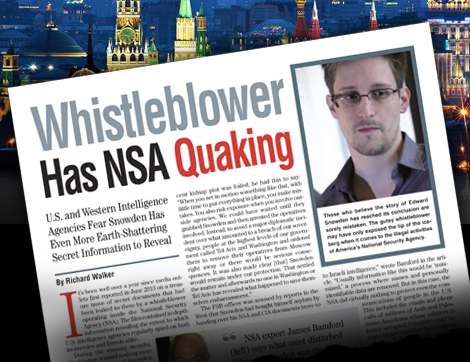
• U.S. and western intelligence agencies fear Snowden has even more earth-shattering secret information to reveal.
By Richard Walker —
It’s been well over a year since media outlets first reported in June, 2013 on a treasure trove of secret documents that had been leaked to them by a whistleblower operating inside the National Security Agency (NSA). The files contained in-depth information revealing the extent to which United States intelligence agencies regularly spied on both its enemies and friends alike.
During the ensuing months, Washington wanted nothing more than to catch Edward Snowden, before he could expose any more secrets, but the wily young computer whiz managed to elude the most powerful country in the world, looking to Russia to protect him from the West.
At the time, and even now, there was considerable paranoia in Washington about what some of Snowden’s stolen NSA documents might contain.
The Central Intelligence Agency (CIA) reckoned if they managed to get Snowden out of Moscow, Russia’s leaders would remain silent about the matter until such times as the U.S. got Snowden into court, possibly in New York. Russia, they believed, would be too embarrassed to admit publicly it had been unable to protect Snowden. By the time Snowden appeared in court, any complaint from Russia would be too little too late and have no serious diplomatic fallout.
According to a Federal Security Service (FSB) source who spoke to this writer on the condition of anonymity, that assessment was naive since Putin had personally guaranteed Snowden’s safety and the FSB was on notice that an attempt would be made to abduct him.
While the source would not confirm how a recent kidnap plot was foiled, he had this to say:
“When you set in motion something like that, with little time to put everything in place, you make mistakes. You also risk exposure when you involve outside agencies. We could have waited until they grabbed Snowden and then arrested the operatives involved. Instead, to avoid a major diplomatic incident over what amounted to a breach of our sovereignty, people at the highest levels of our government called Tel Aviv and Washington and ordered them to remove their operatives from Moscow right away or there would be serious consequences. It was also made clear [that] Snowden would remain under our protection. That settled the matter and afterwards no one in Washington or Tel Aviv has revealed what happened to save themselves embarrassment.”
The FSB officer was amused by reports in the West that Snowden had bought himself asylum by handing over his NSA and CIA documents trove to Russia, saying his understanding was that Snowden had passed off his stolen files before he camped out in Moscow’s airport in 2013 for 39 days.
So far Snowden has largely kept himself out of the press. But in August 2014 journalist and onetime intelligence analyst for the U.S. Navy James Bamford met Snowden in Moscow and came away with one of the most fascinating interviews with Snowden for the recent edition of Wired magazine, describing him as a “sincere idealist” who became disillusioned when he discovered what his government was doing.
According to Bamford, one of the things that most disturbed Snowden when he worked at NSA was how data was being passed to Israel.
“The agency was regularly passing raw private communications—content as well as metadata—to Israeli intelligence,” wrote Bamford in the article. “Usually information like this would be ‘minimized,’ a process where names and personally identifiable data are removed. But in this case, the NSA did virtually nothing to protect even the communications of people in the U.S. This included the emails and phone calls of millions of Arab and Palestinian Americans whose relatives in Israel-occupied Palestine could become targets based on the communications. ‘I think that’s amazing,’ Snowden says. ‘It’s one of the biggest abuses we’ve seen.’ Another troubling discovery was a document from NSA Director Keith Alexander that showed the NSA was spying on the pornography-viewing habits of political radicals. The memo suggested that the agency could use these ‘personal vulnerabilities’ to destroy the reputations of government critics who were not in fact accused of plotting terrorism. The document then went on to list six people as future potential targets.”
The FSB source, like Bamford, suspects Snowden may not be the only whistleblower the NSA and CIA now have to contend with. By Bamford’s reckoning, some revelations that have emerged may not have come from the files Snowden copied.
“My understanding is there has been an ongoing witch hunt within the NSA and the CIA,” said the FSB officer. “I suspect anyone who even had coffee with Snowden over the years is being looked at.”
Richard Walker is the pen name of a former N.Y. news producer.


